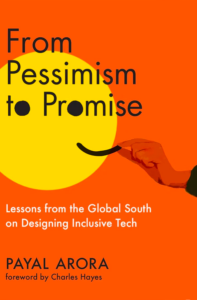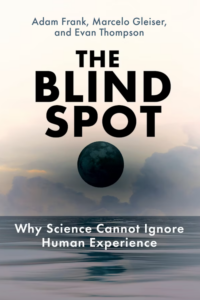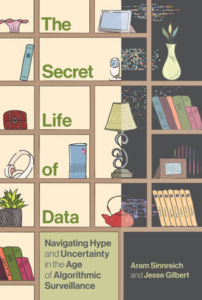“From Pessimism to Promise: Lessons from the Global South on Designing Inclusive Tech” with Professor Payal Arora
The news about emerging technologies often sounds alarming as well as discouraging. Headlines talk about how algorithms control and oppress people. There are fears that AI could harm democracy, damage our social connections, or even cause human extinction. While these fears come from real concerns, it’s also important to recognize the good that technology offers. For young people, tech can provide a unique space for self-growth. In her book “From Pessimism to Promise: Lessons from the Global South on Designing Inclusive Tech”, award-winning author professor Payal Arora shares a different perspective, especially outside the Western world, where most young people live. In these places, there’s a wave of optimism about technology, especially among marginalized groups. These users see hope in the possibilities that new tech brings. In this episode of Bridging the Gaps, I speak with professor Payal Arora.
Payal Arora is a digital anthropologist, consultant, TEDx speaker, and the award-winning author. She is a Professor of Inclusive AI Cultures at Utrecht University and is the cofounder of FemLab, a feminist initiative focused on the future of work.
We begin by exploring how emerging technologies are transforming education in the Global South in positive ways. These changes are not just reshaping traditional systems but also offering new opportunities that bring hope to more people and foster greater inclusivity. Next, we emphasize the importance of context when evaluating and discussing these new technologies. A one-size-fits-all approach doesn’t work; instead, the impact of technology can vary greatly depending on cultural, social, and economic circumstances. Take the example of privacy—what privacy means and how it is valued can shift dramatically when considered in different contexts. In some communities, privacy concerns might revolve around data security, while in others, it may be more about social visibility or personal safety. This makes it essential to examine technologies through a local lens.
We also delve into the concept of the Global South, both as a geographical term and as a mindset. While the Global South refers to countries typically in Latin America, Africa, Asia, and parts of the Middle East, it is also much more than just a place on the map. It represents a way of thinking and living, shaped by shared histories of colonialism, economic challenges, and rapid adaptation to global forces. It is a concept rich with multiple contexts, where resilience and innovation are key themes.
Finally, we explore the sense of hope and optimism that emerging technologies bring to the Global South. In these regions, technology is often seen not as a threat but as a tool for empowerment. People are embracing digital advancements with excitement, seeing them as opportunities to overcome obstacles and build a better future. This contagious optimism is fueled by the ability to leapfrog over outdated systems, creating new paths for social progress, economic growth, and personal empowerment.
Complement this discussion with “Kendall Square and the Making of a Global Innovation Hub” with Robert Buderi And then listen to “The Good-Enough Life” with Dr Avram Alpert.




Connect With Us